The True Origins Of Screen Rant And Game Rant, Valnet’s Powerful News Sites

Modern entertainment news is now delivered primarily by big media companies. The two biggest and most visited are the similarly named sites Screen Rant and Game Rant. Both are owned by a large Canadian company called Valnet.
Valnet claims Screen Rant alone is read by more than 134 million people monthly. Game Rant reaches more than 80 million. No other entertainment news site comes close to those numbers.
That huge online footprint means Screen Rant and Game Rant have become influence powerhouses. It also means it’s worth understanding where they come from.
Screen Rant and Game Rant weren’t always corporate products. Both sites began as Independents, founded Vic Holtreman, a sole proprietor with a passion for movies and a determined work ethic. He bootstrapped that passion into two sites that have since become some of the most read things on planet Earth.
“Google used to serve users by being transparent, they wanted to put the best website content in front of users. But eventually, their algorithm and approach changed to do two things: Scrape content from sites and put summaries in their search results, causing people not to need to visit the site they took the content from and favoring huge corporate sites over focused, independent sites.”
Vic Holtreman’s name is not referenced on the About pages of either Screen Rant or Game Rant. Their current owner only discloses that the two sites were acquisitions; there’s no mention of where they came from.
A few weeks ago, I set out to change that lack of information by contacting Vic for an interview. This is Screen Rant and Game Rant’s origin story, as told by their original founder, Vic Holtreman.
Screen Rant And Game Rant Founder Vic Holtreman, Now
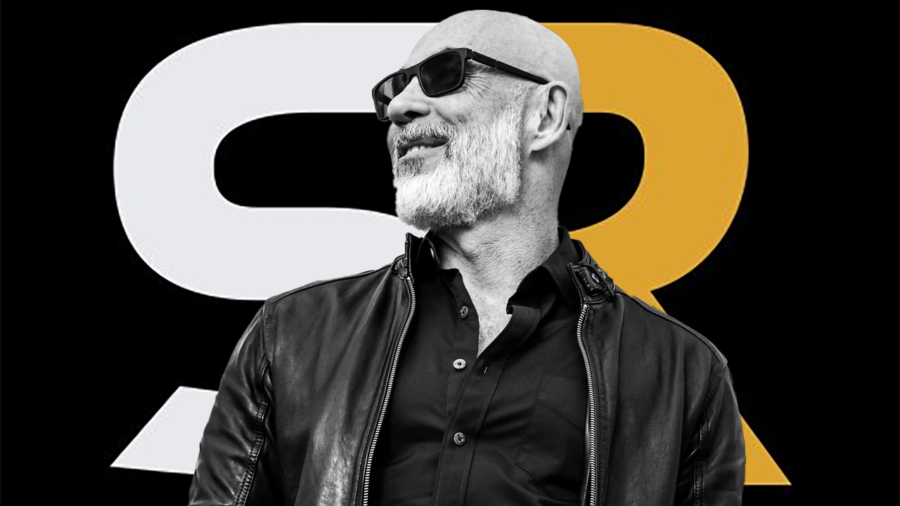
These days Vic Holtreman is retired from hectic online publishing and living a quiet life. He sold Screen Rant to Valnet in 2015 during what Vic describes as a “bit of a mini “gold rush” by companies looking to buy independent movie news sites.”
That year saw numerous independent site acquisitions by big media companies, including the sale of my own site Cinema Blend, completed a few months before the sale of Screen Rant.
“I’ve had people reach out to me about it after I sold the site, missing those days.”
Vic Holtreman then sold Game Rant to the same big company a few years later.
Despite being long disconnected from the online publishing world, Vic graciously agreed to connect with me. We talked about where it all started and how Screen Rant and Game Rant got to where they are now.
Vic Holtreman’s Path To Online Publishing
Screen Rant was the end of a long and varied career path for Holtreman, not the start of it. Long before he began talking movies on the internet, Vic says he “Dropped out of college twice, ended up as a fry cook at a chain restaurant after a brief attempt at selling insurance in my early twenties.”
He wasn’t satisfied and knew he was meant for something better. So he took a leap and, almost on a whim, joined the Navy. He served his country for four years, and when he finished, Vic “left North Island naval base in Coronado for the last time, got a job waiting tables at Pizza Hut, and I enrolled in a one-year drafting school.”
He turned that into a successful career in IT, which lasted until the 2000s dotcom bubble burst. In response Vic says, “Instead of looking for another job, I’d started doing affiliate marketing on the side and was doing quite well, teaching myself SEO. So I focused on that.”
How Vic Holtreman Created Screen Rant
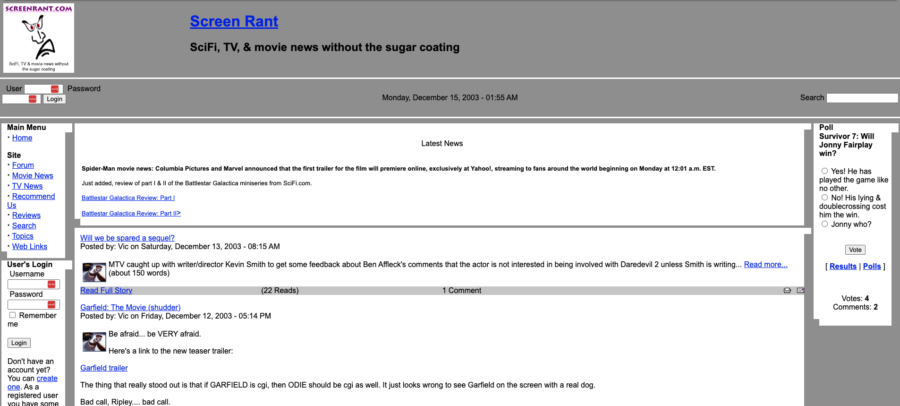
The early 2000s found Vic working in IT, but he wanted more. Vic says, “I’ve always loved movies and TV, and back when I was young, the only way to get Sci-Fi movie news was to wait for the monthly edition of Starlog magazine. When “weblogs” came on the scene, I thought the idea of an online journal was interesting.”
Since he was already in IT, he had the technical skills to make it happen, so in 2003, “I taught myself HTML and registered the domain “ScreenRant.com” because I wanted to “rant” about the stuff I disliked about Hollywood. I chose “ScreenRant” instead of “MovieRant” because I also wanted to talk about TV.”
He never imagined it would grow into anything big. Vic says, “Early on it was just for fun. I really never thought anyone would read what I wrote.”
The early online ad industry was starting to emerge from the doldrums of the dot-com bust. People were beginning to flock to the Internet in large numbers for the first time. It was in that same year that MySpace was founded and WordPress came into being.
Vic says, “This was in the early days of Google, when it was much easier to rank on the first page and there were only a fraction of the number of websites online that there are today. I started to get more and more visits, and when I added a comment module to the site, I found people really liked what I had to say.”
Screen Rant Battles Through Setbacks To Find Success
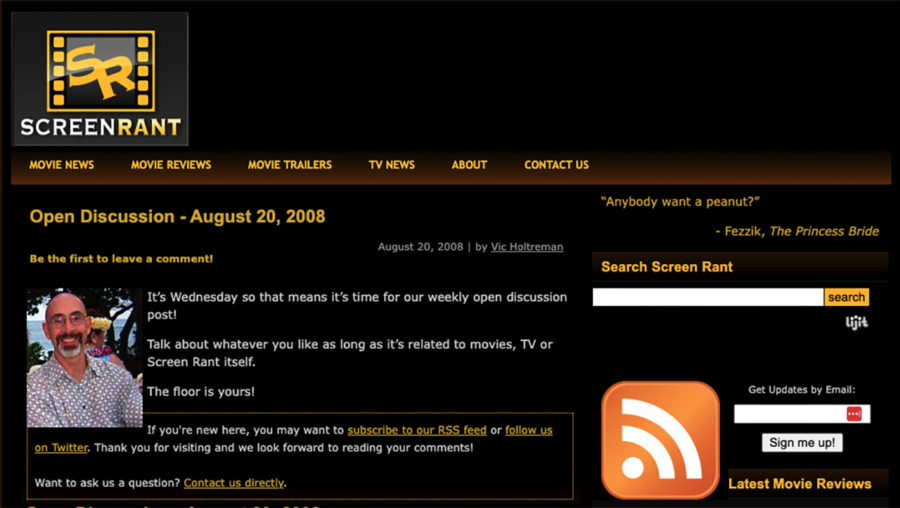
The site grew, and Vic made it his primary job. Unfortunately, keeping it going wasn’t easy.
Vic says, “Around 2008 my affiliate income started dropping off due to competition on Google, and I’d brought on my first paid editor. I had to decide whether to let my editor go, or go myself back to a desk job. I got a job, migrated to being in charge of SEO at the company, and worked there until 2011, when I decided, based on how the site was doing and the trajectory it was on, to quit and work on Screen Rant full time instead of just nights and weekends.”
There were huge setbacks along the way, and even back then, Google was getting between Independent Publishers and their audience. Vic says, “I think there was a Google algorithm update at one point that had us scrambling a bit and caused traffic to drop for a few months. It was tough, because I always made sure I paid my staff first, and I think for a short while I had to adjust payments downward while not getting paid myself. We got through it, though, and everything ended up fine.”
Despite any setbacks, Screen Rant continued to grow, soon reaching millions and millions of readers each month.
Holtreman attributes the site’s success to his understanding of Screen Rant’s audience. He explains, “Being a fanboy myself, I knew what kind of news and information hard-core movie fans were interested in, and I had my team skew content in the direction that would feed that hunger. I also only focused on popular movies and TV shows, the stuff that had broad appeal.”
That might sound obvious now, but at the time, the trend among many of his competitors was to focus more on covering “prestige” topics like independent movies and traveling to attend niche film festivals. That might sound good, except it was not something most readers cared about. Vic recognized what his readers wanted because it was what he wanted, and so he gave it to them.
That shared interest in catering to readers, rather than peer prestige, is what first brought Vic and me in contact back in the mid-2000s. Though we were competitors, we often shared tips and ideas as we built our respective sites, Cinema Blend and Screen Rant, into internet powerhouses.
Vic says, “So not only did we cater to the fan base that cared what shade of blue Superman’s costume would be in the upcoming movie, but we also catered to people who were die-hard Lost fans and wanted an explanation of the goings-on in the show.”
As Screen Rant grew, so did the size of the team Vic had working with him. Holtreman credits the team he built with being part of the site’s success. He explains, “I hired a dedicated bunch of talented and passionate writers and editors who were able to take that vision and run with it. I was always there at the 10,000-foot level, making slight course corrections, paying attention to what was trending and what was likely to be “hot” in the upcoming months.”
The Origins Of Vic Holtreman’s Game Rant
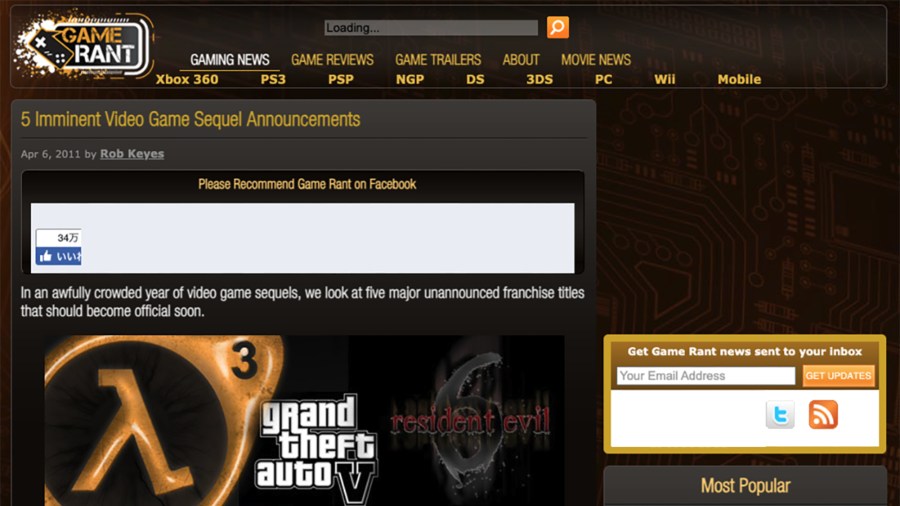
With Screen Rant running smoothly, Vic decided to do more. He says, “I had some Screen Rant writers who were avid gamers, and they suggested we start a gaming version of Screen Rant.”
Vic Holtreman founded Screen Rant without any help or investment. As he explained it to me, “I only paid people if there was money coming in.”
Things were different with Game Rant. He thought he needed an expert in the field because “it was tough early on with Game Rant because it was all volunteers, no paid writers. No traffic = no revenue. I needed someone to run the site who knew gaming. The last time I’d played video games was back in the days of Pac-Man and Asteroids. It was tough trying to keep unpaid writers motivated and writing.”
So Holtreman decided to try something different with Game Rant and partnered with someone he believed had the right expertise as a co-owner. It did not go well. The problem, it seems, is they had very different ideas about what kind of quality standards their work should meet.
Vic explains, “When I launched Game Rant, I made it very clear that the approach to content should be the same as on Screen Rant in regards to everything: article length, quality, and approach. Google was very sensitive to what they perceived to be article quality, which they in part associated with word count. I gave strict parameters for minimum article word count, and for a while, the site was growing and tracking well.” That early success didn’t last.
We were ignoring the vast majority of people out there who I surmised were like me: casual gamers.
As Holteman explains it, “Suddenly traffic fell off a cliff. I investigated and found hundreds of “thin content” articles on the site. Super short articles – you couldn’t even really justifiably call them “articles.” Exactly what I had instructed them NOT to write.”
Low-quality content was not something Vic Holtreman wanted to be associated with. He confronted his partner and now says, “We butted heads, and parted ways. It took two years for the site to recover from that, and in the meantime we lost ground to competing game sites that started around the same time, like Polygon.com.”
Vic now says of his initial Game Rant partner, “He mismanaged the site, not focusing on the right content, and caused it to get penalized by a Google algorithm update.”
Luckily, Holtreman wasn’t saddled with that partner forever. He bought him out and moved forward as Game Rant’s sole owner. That worked, and “the growth of the site started in earnest after we parted ways.”
How Game Rant Became A Huge Success Under Vic Holtreman’s Leadership
Now the sole owner of two big media sites, Vic Holtreman was about to get very busy, He says, “When the partnership ended, I rolled up my sleeves and told myself I needed to get up to speed on current gaming if I was going to run the site. I bought a PS4 and started playing Destiny. It was a fun game and very popular at the time. I was not an expert, so I’d run into a boss I couldn’t get past, try about 10 times, and then I just wanted to get on with the game.”
He thought the solution to his video game problems would be on his own website, so Vic says, “I went to Game Rant to search for tips on how to get to the next level, and found nothing. I’d go to Google and find tons of articles helping me. This happened repeatedly, so I decided to change the focus of Game Rant.”
The difference was in who the site was for. His partner had created a site for a small audience of elites and other journalists. Vic says, “Up until then it was a site written by advanced gamers FOR advanced gamers. Now that’s a good audience, but we were ignoring the vast majority of people out there who I surmised were like me: casual gamers. People who weren’t hard core and didn’t mind looking for a “cheat” after a number of tries of beating some boss or some level. So the new focus of the site was guides, guides, guides. Tips and more tips. And focus on the most popular games.”
In a sense, Vic turned his own weakness, his lack of knowledge about video games, into Game Rant’s strength. It worked. Holtreman says, “After that, traffic started climbing steadily, year over year as we fine tuned and honed our focus.”
As the site got back on his feet, he looked for help. He found it in Anthony Taormina, one of Game Rant’s original contributors. He says of Anthony that he “happily followed my advice, and he is the person who helped Game Rant grow dramatically until I sold it. He is Editor in Chief to this day, and growing the site far beyond what it was when I owned it.”
The Feeling Of Success

By 2014, Screen Rant was one of the most popular entertainment news sites in the world. What’s it like being on top? For Vic Holtreman, the most exciting thing about it was the response they were getting.
Vic says, “I had a lot of dedicated fans of the site. We’d publish an article, and we had a core group of people who would show up just to have kind of a round table conversation about anything. Any article might get 70+ comments, it was a community, I was very proud of that”
That dedicated community helped Holtreman raise Screen Rant’s profile. Vic says, “One day I opened my email and a fan sent me a bunch of photos of something he came across in the desert outside of LA. It turned out to be the terrorist camp set from Iron Man, where he came out of the cave and used his flamethrowers to burn everything down. He said “I thought you might be interested in these.” So with that, Screen Rant published the first unauthorized set photos of the first Iron Man movie, at a time when everyone was desperate for a morsel of news about the production. It put the site on the map.”
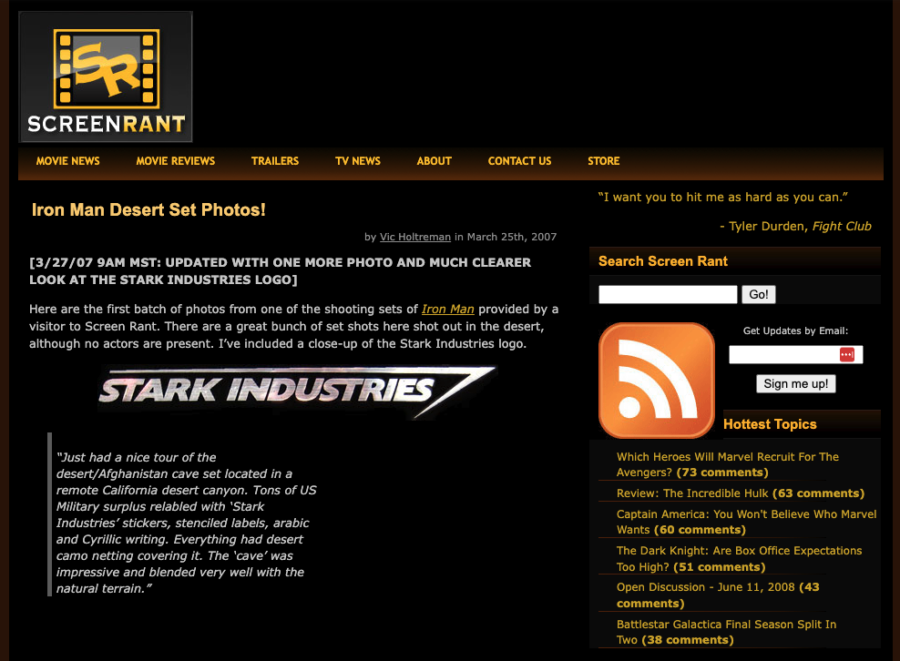
Vic was never focused on meeting famous people, but that doesn’t mean there weren’t some big encounters that stuck with him. He says, “…my most enjoyable encounter was a toss up between Tom Hiddleston and Benedict Cumberbatch.”
Why Vic Holtreman Sold Screen Rant To Valnet, And Why He Left The Company
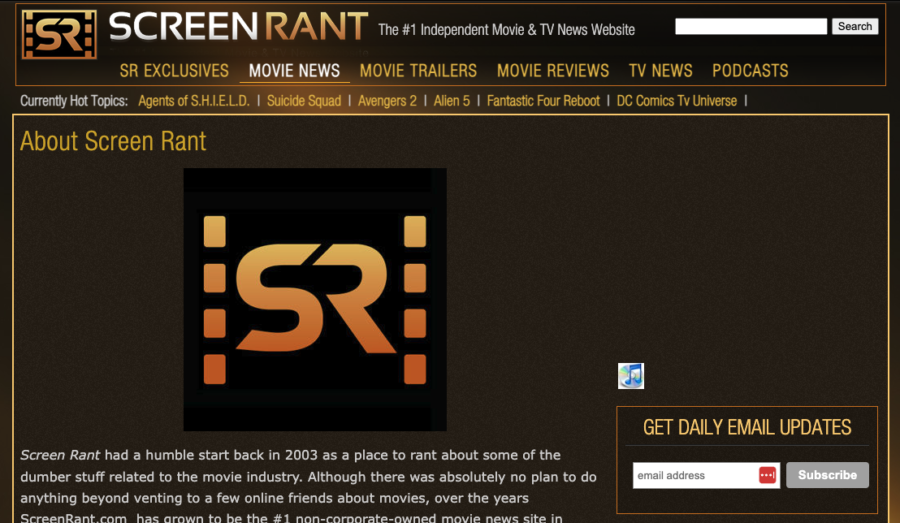
Vic Holtreman sold Screen Rant to the Canadian media company Valnet back in 2015. This was shortly after I sold my own site, Cinema Blend, in that same year. At the time, Cinema Blend and Screen Rant were neck and neck as the two most popular independently owned entertainment news sites on the web. So, of course, big corporations wanted them.
Vic confirms, “I think three or four sites sold within a couple of months of mine (including yours!).”
For Holtreman, the time was right. He says, “I had taken the site about as far as I thought I could (at the time, about 15 million visits/month) with my resources and abilities. I always bootstrapped the site, cash in, cash out, I never borrowed or took on investors, and perhaps that limited my ability to grow the site further.”
The web was also changing, constricting, and beginning to favor big media companies over Independent Publishers. There was no better time to sell, and Vic saw the writing on the wall.
It was a good run. He says, “I’d been running it for 12 years and for me the fun of running it had peaked, and it was turning more into just work.”
He also didn’t like the direction of discourse among journalists at the time. Holtreman elaborates, “Very early on I was starting to sense that things were subtly starting to turn in the direction of wokeness, and I thought that was going to be a big trend in entertainment – and I didn’t want to try to run and navigate a movie and TV news site in that environment.”
Often when a big company acquires an Independent Publisher, they keep the previous ownership team involved. It’s a way to maintain continuity and create a smooth transition.
That’s what happened when I sold Cinema Blend to a company called Gateway Media, shortly before Vic sold Screen Rant to Valnet. Gateway kept me on for the next six months after the sale, to oversee the site’s transition. Vic expected a similar outcome with Screen Rant, but that’s not what happened at all.
Valnet did not want Vic Holtreman to stick around with the company he’d created. Vic says they told him, “No, we’ve got this.” He says, “It was a clean exit for me.”
Vic doesn’t regret selling, but it doesn’t sound like his previous readers are happier now than they were when he was there. Holtreman reveals, “I’ve had people reach out to me about it after I sold the site, missing those days.”
How Valnet Acquired Game Rant From Vic Holtreman
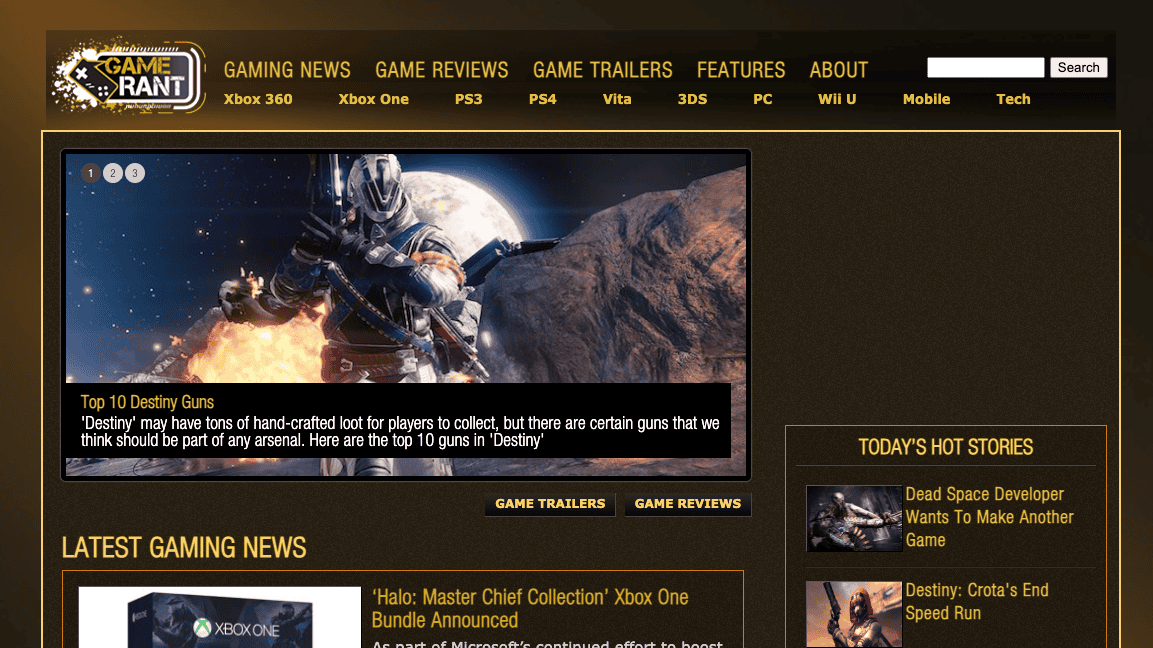
With Screen Rant under Valnet’s ownership, Vic was focused on Game Rant as his sole business. But, he explains, “I was not passionate about games or gaming, and now there was a new difficulty in trying to get traffic from Google: Mainstream corporate websites writing gaming news and gaming guide articles. I mean sites like Forbes and trashy tabloid sites like The Daily Record. And because they were huge sites, Google would rank them for gaming articles, even though the sites had no focus on that. This was long after Google’s “Do No Evil” slogan stopped being valid.
Most Independent Publishers would now say Vic accurately understood the future. The problems he had back then are, according to many, now worse.
Vic told me, “Google used to serve users by being transparent, they wanted to put the best website content in front of users. But eventually, their algorithm and approach changed to do two things: Scrape content from sites and put summaries in their search results, causing people not to need to visit the site they took the content from and favoring huge corporate sites over focused, independent sites. The writing was on the wall, and I thought it was a good time to get out.”
Vic Holtreman decided it was time to move on from being an Independent Publisher. He didn’t see a clear future in it. So, when Valnet approached him and offered to buy Game Rant, he said yes.
When he sold Game Rant, the situation mirrored his sale of Screen Rant. Valnet didn’t want him to remain part of the company. So, he moved on.
Life After Screen Rant And Game Rant
Since selling Game Rant, Vic has stayed out of the online publishing world. Unable to resist the allure of a new technology he says, “For a while I was dabbling with some sites with AI-created content, but I think I’m done with that.”
“The online landscape has changed so much… I didn’t feel like spending tens of thousands of dollars in the hope it would become eventually profitable, especially in view of the way Google favored their own and corporate content.”
Instead, since ending his career as an Independent Publisher, Vic has focused on enjoying life and improving himself. He says, “I just recently remarried and am enjoying my life. Staying fit, traveling, working on increasing my faith and getting closer to God.
Vic Holteman’s Advice To Independent Publishers
I’ve talked a lot on this site about how much the online publishing world has changed since Vic and I were friendly competitors in those much earlier days. I may have underestimated it.
When I asked Vic what advice he might have for Independent Publishers still out there in the internet trenches, he said: “The online landscape has changed so much. It seems like today it’s more about having a personal brand on social media than about a traditional domain-based website. I actually tried launching an automobile news site a few years ago – it was bleeding money. Basically a very expensive hobby, and I didn’t feel like spending tens of thousands of dollars in the hope it would become eventually profitable, especially in view of the way Google favored their own and corporate content.”
In the end, what may matter most is that you stay true to what you believe in. Vic says, “Networking is always important, it’s good to have friends in the same field. I would say reputation is even more important. Guard your reputation.”













Login with Google